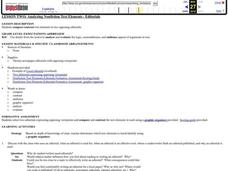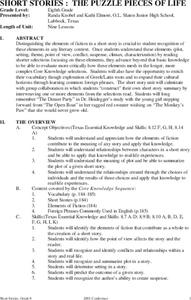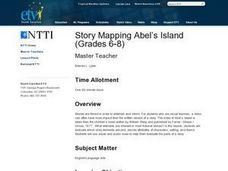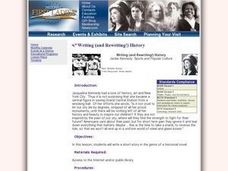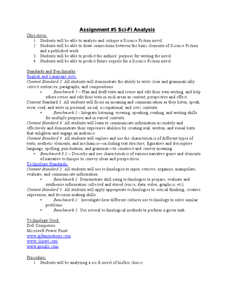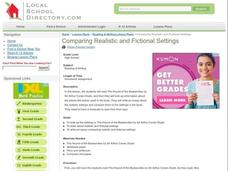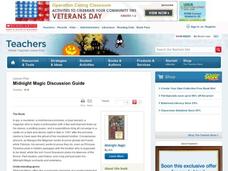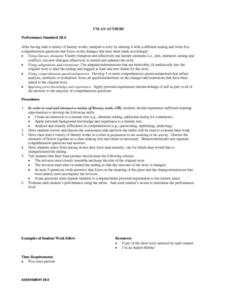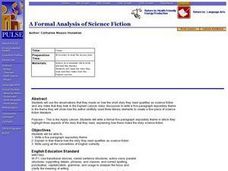Curated OER
Analyzing Nonfiction Text Elements - Editorials
Students examine the text features of non-fiction. In this literacy lesson, students read editorial samples provided by their instructor and analyze the texts for word choice, details, and organization.
Curated OER
Short Stories: The Puzzle Pieces of Life
Students distinguish the elements of fiction in a short story. In this fiction elements lesson, students complete nine lessons of activities to learn about the elements of fiction in short stories.
Curated OER
Brown Bagging with Short Stories
Students participate in a study of short story elements, applying their knowledge and understanding to a selection of short stories. In this short stories lesson, students read five short story selections, identifying conflict,...
Curated OER
Story Mapping Abel's Island
Students are able to prioritize story elements using graphic organizers. They are able to evaluate character, setting and sequence in a non-print source. Students use visual and audio clues to help them evaluate the parts of a story.
National First Ladies' Library
Writing (and Rewriting!) History
Middle schoolers differentiate between fiction and non-fiction, discuss historical fiction, which combines both genres, choose historical novel from list and read independently, and write original short stories that combine elements of...
Curated OER
Assignment #5 Sci-Fi Analysis
Class members select a science fiction novel for independent study. To verify they have completed the reading, they write a summary, a critique, and an outline of the plot for a sequel or prequel. They then deliver a five-minute...
Curated OER
Context Clues, Plot Structure, Conflict, and Personal Narrative Essay
What are the elements of a personal narrative? Get your class talking by reading "The Necklace" and "A Dangerous Game." The lesson focuses primarily on defining certain vocabulary terms (like context clues, plot, conflict, climax, etc.)...
Curated OER
Comparing Realistic and Fictional Settings
Learners examine setting in a work of realistic fiction. For this literature lesson, students read The Hound of the Baskervilles by Sir Arthur Conan Doyle and then write an essay that compares real-life settings to the settings in the...
Curated OER
Writing a Historical Fiction Story
Pupils create a historical fiction story. In this historical fiction lesson plan, students choose a time period to use as their setting. They create a story with true elements but fictional characters and plot.
Scholastic
Midnight Magic Discussion Guide
This discussion guide accompanies the fiction book Midnight Magic written by Avi, enforces story elements, inferences, and theme/plot. Have the class work on it over time, it will engage even your reluctant readers.
Curated OER
The News Behind the Story
What a fun way to analyze plot, setting, and character. Learners review story elements, read a short fictional story, then turn the events of that story into a headlining news paper article. Not only does this lesson engage critical...
Hood River County School District
Text Structure: Features and Organization
Teach learners how to interact with both fiction and non-fiction text with a packet of activities and worksheets. After looking over text structure and the difference in text features between different types of writing,...
Curated OER
Understanding Protagonists and Antagonists
How can you tell if a character is a villain? What about a hero? Work on literary analysis with an engaging language arts instructional activity. After completing an activity about the four types of conflict, learners fill out a...
Curated OER
The Time Machine
Challenge your class with this lesson! Learners read The Time Machine by H.G. Wells, discuss context clues, identify main ideas and details, and analyze story elements. Discussion questions and activities are broken down for each chapter...
Curated OER
I Am An Author
Analyze and interpret a literary work your class has read during the course. After reading a variety of literary works, middle schoolers alter the ending of a selection by creating an alternate ending. They generate five comprehension...
Penguin Books
Core Curriculum Lesson Plans for Jefferson's Sons
Thomas Jefferson lived a controversial life. A series of lesson plans shares information about Jefferson's Sons, a novel about the infamous founding father. Discussion questions and other tasks explore different points of view and cover...
Curated OER
The Similarities and Differences of Setting
Sixth graders identify components of the setting in science fiction text. In this compare and contrast settings instructional activity, 6th graders read Only You Can Save Mankind and identify similarities and differences between...
Curated OER
Mosaic America on Film: Fact Versus Fiction
Seventh graders define race, ethnic group, and culture. They identify the ways in which words are used in political cartoons and examine the way visual elements in a cartoon determine the meaning of words and enhance their impact. They...
Curated OER
Fantasy
How do you know the book you are reading is a fantasy? Explore the characteristics of the fantasy genre as you read the story Zathura with your class. Together you'll create a class chart that identifies the fantasy genre while building...
Curated OER
Blending Fiction and Nonfiction to Improve Comprehension and Writing Skills
Students explore a content area by reading both fiction and nonfiction texts on the topic. They do more research online about the topic. After comparing the texts, they create their own written original work, using both narrative and...
Curated OER
A Formal Analysis of Science Fiction
High schoolers write a five paragraph expository theme. They explain in their theme how the story they read qualifies as science fiction. Students write using all the conventions of English correctly.
Curated OER
Understanding Science Fiction
Fourth graders learn about the genre of science fiction. In this science fiction lesson, 4th graders learn about the characteristics of science fiction as a genre. They write an original piece of science fiction.
Curated OER
Build Mastery: Sequencing
Writing a summary is much easier once you've laid out the sequence of events. Show readers how these two skills are intertwined using this graphic organizer. Review the meaning of sequencing first, presenting the chart and possibly...
Curated OER
Identifying Text Features of a Self-Written Fable
Make learning the parts of a book fun by having pupils construct their own glossary entries, table of contents, and title page. Beginning with a review of text features and a hunt for examples, kids use previously written fables to...
Other popular searches
- Elements of Fiction
- Literary Elements of Fiction
- Elements of Non Fiction
- Elements of Fiction Books
- 8 Elements of Fiction
- Teaching Elements of Fiction
- The Elements of Fiction
- Elements of Fiction Conflict
- Elements of Fiction Hatchet
- Humor Elements of Fiction
- Realistic Fiction Elements
- Elements of Mystery Fiction


